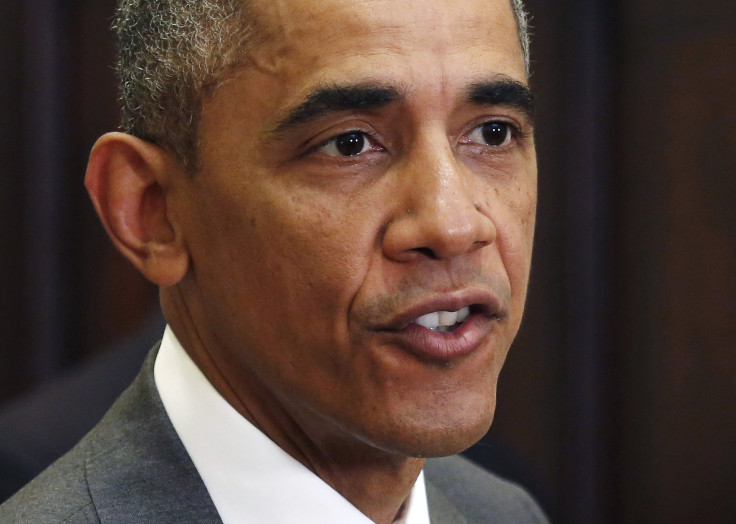President Obama On 'Face The Nation': 1,500 Additional U.S. Troops In Iraq Will Not Be In Combat

Some 1,500 more U.S. troops are heading to Iraq but not into direct combat with Islamic State militants, President Barack Obama, who spoke about Iraq, Iran, immigration and the Democratic losses in Congress, said Sunday on CBS "Face the Nation." The additional troops double the current U.S. presence in Iraq to slightly more than 3,000 soldiers.
“Phase 1 was getting an Iraqi government that is inclusive and credible,” Obama said. “We now have done that. So now what we’ve done, rather than just halt ISIL’s [the Islamic State also referred to as ISIS] momentum, we’re now in a position to go on some offense. Airstrikes have been very effective in degrading ISIL’s capabilities and halting ISIL’s advance. Now what we need is ground troops, Iraqi ground troops to push them back. … Our troops are not engaged in combat.”
American troops will provide logistical support, and when those troops go into combat, the U.S. will provide close air support, Obama said. The U.S. will set up four training centers with the help of “coalition” members, which could include a group of Arab states taking part in airstrikes against Islamic State militants, but Obama did not specify which countries would be involved. The 1,500 U.S. troops will help to train Iraqi volunteers and Sunni tribesmen fighting the extremists, Obama said.
“What we will not be doing is having our troops on the ground,” he said.
Watch President Obama’s entire 20 minute interview on "Face the Nation" here. President Obama also spoke about negotiations with Iran to reduce sanctions and put an end to their potential pursuit of nuclear weapons. Those negotiations are not linked in any way to Iran’s actions against the Islamic State in Iraq, Obama said. U.S. and Iranian commanders are not coordinating, he said.
Rep. Darrell Issa, R-Calif., a former Army captain, disagreed with Obama’s choice in an interview with ABC’s “This Week.”
“If we're to protect the gains we made against Islamic extremism, my Marines from Camp Pendleton and others are going to have to go back again,” he said. The Iraqi government is “quite delusional,” he said.
Domestically, Obama is coming off a disastrous week for Democrats, who lost the Senate and again failed to gain a majority in the House of Representatives.
“We got beat,” he lamented.
Obama was insistent he is ready to work with a Republican Congress to push forward immigration reform, but said his administration would continue to work on unilateral executive actions to mend a “broken immigration policy.”
Republican leaders reiterated warnings to Obama this week if he does so, he would lose support of the Republican Congress, with which he must work in the next two years. An uncooperative Congress could mean two more years of gridlock in Washington. Incoming Senate Majority Leader Mitch McConnell, R-Ky., likened unilateral action to “waving a red flag in front of a bull,” and House Speaker John Boehner, R-Ohio, said Obama would “poison the well” if he signed an executive order on immigration.
“I think it would be like the president pulling the pin out of a hand grenade and throwing it in as we try to actually work together,” said Sen. John Barrasso, R-Wyo., on "Fox News Sunday" this week.
Analysts attributed the Democrats’ poor performance partly to Obama’s low approval ratings. A Gallup poll taken last week found 41 percent of Americans said they approve of his performance and 54 percent said they disapprove. His low approval ratings are because Americans identify gridlocked Washington with the president, he said.
“I’ve got to make this city work better, for them,” he said.
Despite the difficulties, Obama said: “I love this job.”
© Copyright IBTimes 2025. All rights reserved.






















